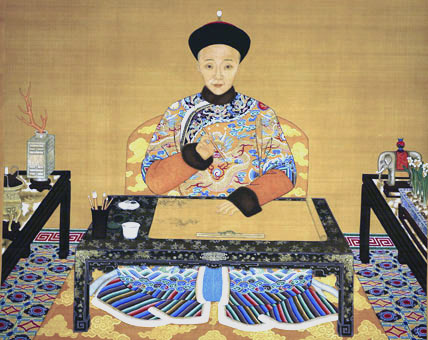<Back to Index>
- Inventor Ephraim Shay, 1839
- Painter Lyonel Charles Feininger, 1871
- 9th Qing Emperor of China Xianfeng, 1831
PAGE SPONSOR


The Xianfeng Emperor (Chinese: 咸豐帝; pinyin: Xiánfēngdì; Mongolian: Tugeemel Elbegt Khaan; 17 July 1831 – 22 August 1861), born Yizhu, was the ninth Emperor of the Manchu led Qing Dynasty, and the seventh Qing emperor to rule over China, from 1850 to 1861.
Yizhu was born in 1831 at the Imperial Summer Palace Complex, 8 kilometers northwest of the walls of Beijing, and was the fourth son of the Daoguang Emperor. His mother was the Imperial Concubine Quan (全贵妃), of the (Manchu) Niuhuru clan, who was made Empress in 1834, and is known posthumously as Empress Xiao Quan Cheng (孝全成皇后).
Chosen
as the Crown Prince in the later years of Dao Guang's reign, Yizhu had
reputed ability in literature and administration which surpassed most
of his brothers. He succeeded the throne in 1850, at age 19, and was a
relatively young Emperor. He inherited a crumbling dynasty that faced
challenges not only internally, but also from Europeans. The situation
was not reflected at all by his reign title, Xianfeng (咸丰/咸豐), which means "Universal Prosperity." The Taiping Rebellion began in 1851, and spread to several provinces with amazing speed. Xianfeng dispatched several prominent mandarins, like Zeng Guofan, and Imperial relatives, like the Mongol general Senggelinqin, to crush the rebellion, with limited success. Several Muslim rebellions in the southwest began in 1855. As
western imperialism was carving a path through Asia, China was not
spared. The European powers saw the weakening Qing Empire as ripe for
exploitation. Anglo - French forces, after inciting a few battles on the
coast near Tianjin,
of which not all were decisive victories, attempted "negotiation" with
the Qing Government. Xian Feng, under the influence of the Concubine Yi
(懿貴妃, later the Empress Dowager Cixi), believed in Chinese superiority and would not agree to any colonial demands. He delegated Prince Gong for
several negotiations that failed to solve any significant problems. On
18 October 1860, the western forces went on to loot and burn the
Imperial Summer Palaces of Qīngyī Yuán (清漪园/清漪園) and Yuánmíng Yuán (圆明园/圓明園). While
negotiations with the European powers were in deliberation, Emperor
Xianfeng and his Imperial entourage fled to the northern palace in Jehol.
Becoming more ill physically, Xian Feng's ability to govern also
deteriorated, leading to competing ideologies in court that eventually
formed two distinct factions — those under the rich Manchu Sushun, Princes Yi and Zheng; and those under the Concubine Yi, supported by Gen. Ronglu and Yehenala Bannermen. Xian Feng died on 22 August 1861, at the imperial summer resort (行宮 xinggong) in Jehol, 230 kilometers northeast of Beijing. Being succeeded by his one surviving son, Zaichun,
who was barely 6 years old, Xianfeng had summoned Sushun and his group
to his bedside a day before, giving them an Imperial Edict dictating
the power structure during the young Emperor's minority. The edict
appointed four members of the Imperial line, namely, Zaiyuan, the Prince Yi; Duanhua, the Prince Zheng; Duke Jingshou; and Sushun,
and four Ministers, Muyin, Kuangyuan, Du Han, and Jiao Youying, as the
eight members of a new regency council to aid the young Emperor. By
tradition, after the death of an Emperor, the body was to be
accompanied to the Capital by the regents. Concubine Yi and the Empress, who were now both given titles of Empress Dowager,
traveled to Beijing ahead of time, and planned a coup that ousted
Sushun from the regency. The Concubine Yi would subsequently rule China
for the next 47 years, as the Empress Dowager Cixi. Emperor Xianfeng was interred in the Eastern Qing Tombs (清東陵), 125 kilometers/75 miles east of Beijing, in the Dingling (定陵 "Tomb of Quietude") mausoleum complex.
Xianfeng
had a large sexual appetite. He was a lover of opera and alcohol, and
often became violent with his servants. He was known to smoke opium.